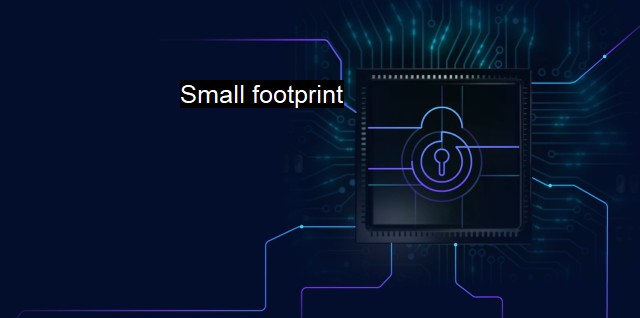What is Small footprint?
Efficiently Effective: Small Footprint Antivirus Software for Cybersecurity
In the realm of cybersecurity and antivirus software, the term "small footprint" is frequently used. Fundamentally, a "small footprint" refers to the minimal usage of system resources such as memory, disk space, and processing power by a software or application.Typically, cybersecurity software and antivirus solutions, due to their numerous real-time activities for ensuring round-the-clock security, consume a significant part of the system's resources. this consumption, if too large, can lead to a system's sluggishness, leading to inefficient functioning.
This is where the concept of a "small footprint" comes in. Today, cybersecurity and antivirus providers aim to develop solutions with smaller footprints because smaller-footprint software assists in enhancing a computer system's performance. A small footprint antivirus software quickly scans your system without obstructing the functioning of other applications, using the least possible amount of system resources.
Imagine performing a massive data processing task or hosting an online meeting. In both cases, your computer's memory and processing power are much in demand. If your antivirus also demands a significant portion of your memory, the efficiency of your task might get compromised. If your antivirus solution promises a 'small footprint,' it ensures optimal utilization of system resources, not meddling with your ongoing tasks or causing your system to lag.
These types of sofware, because of their tiny dimension, can run incessantly in the background without draining battery life, thus ensuring continuous, real-time security against potential threats such as viruses, malware, spyware, ransomware, or phishing attacks.
Another significant factor is that cybersecurity software with a small footprint allows the seamless integration of security solutions. With limited memory and processing speed, bloated software could hamper effective integration, necessitating a trade-off between security and performance, something no organization or individual would prefer.
From a system maintenance perspective, utilities with smaller size take less time to update or upgrade, effectively maintaining your system's performance while ensuring that you are covered for the latest online threats. Notably, despite being small in size, these software do not compromise on the depth of their scanning activities or their ability to detect and mitigate the latest threats.
a "small footprint" in cybersecurity and antivirus context refers to software design that uses minimal resources. While memory size, disk space, and processing power are key resources such software aims to lessen the load on, it still ensures optimal functionality and security level that a user requires. It continues to provide its necessary functions—ensuring the security of the system against potential threats—without causing the system to downshift or become sluggish. Overtime, cybersecurity companies are working relentlessly towards reducing their software's footprint. This enhances system performance, enables real-time security updates, and ensures a comfortable, efficient user experience. Therefore, when choosing an antivirus or cybersecurity solution, considering the footprint size becomes essential, resonating with the old adage in the computing world – “smaller is better”.

Small footprint FAQs
What does "small footprint" mean in the context of cybersecurity and antivirus software?
In the context of cybersecurity and antivirus software, "small footprint" refers to software that has a low impact on system resources. This means that the software uses minimal CPU, memory, and disk space compared to other similar software.How does using antivirus software with a small footprint benefit my computer's performance?
Using antivirus software with a small footprint can improve your computer's performance because it doesn't use a lot of resources, leaving more resources available for other processes on your system. This can result in faster performance and fewer slowdowns or crashes.Is it important to choose an antivirus software with a small footprint?
Yes, it is important to choose an antivirus software with a small footprint because it can have a big impact on your overall computer performance. Software that uses too many system resources can slow down your computer, especially if you have an older or less powerful system. By choosing software with a small footprint, you can ensure that your computer runs smoothly and efficiently.Are antivirus software with small footprints less effective than those that use more system resources?
Not necessarily. Antivirus software with a small footprint can still be just as effective at detecting and removing malware as software that uses more system resources. The size of the software's footprint doesn't necessarily affect its ability to protect your computer. However, some software may sacrifice functionality or features in order to maintain a small footprint, so it's important to choose software that meets all of your cybersecurity needs.| | A | | | B | | | C | | | D | | | E | | | F | | | G | | | H | | | I | | | J | | | K | | | L | | | M | |
| | N | | | O | | | P | | | Q | | | R | | | S | | | T | | | U | | | V | | | W | | | X | | | Y | | | Z | |
| | 1 | | | 2 | | | 3 | | | 4 | | | 7 | | | 8 | | |||||||